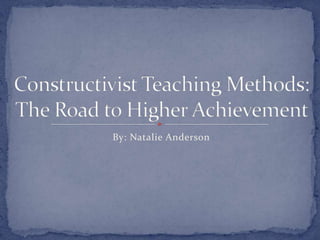
Constructivist Teaching Methods
- 1. By: Natalie Anderson Constructivist Teaching Methods:The Road to Higher Achievement
- 2. According to Brader-Araje & Jones (2002), constructivism can be defined as “the idea that development of understanding requires the learner to actively engage in meaning-making.” “While constructivism takes on different theoretical meanings with different theorists and contexts, the over arching concept hinges itself upon the nature of knowing and the active role of the learner” (Brader-Araje & Jones, 2002). What is Constructivism?
- 3. The 21st-century classroom is filled with a dynamic assortment of learners. Students are coming from all different types of socioeconomic backgrounds, culturally diversified experiences, and learning styles and preferences unique to each individual. These dynamics create a challenge for teachers as they attempt to accommodate the needs of all learners within the various academic settings. "Constructivism is not a theory about teaching…it is a theory about knowledge and learning… the theory defines knowledge as temporary, developmental, socially and culturally mediated, and thus, non-objective” (Brooks & Brooks, 1993, p. vii). Why Constructivism?
- 4. A Holistic Approach- Traditional classrooms typically begin their curricular units by exploring individual lessons that are a part of a big idea. Constructivist classrooms, however, emphasize the big ideas, beginning with the whole and expanding to include the parts. “The adoption of a more holistic approach to education for sustainability is also likely to demand that consideration be given to the environment in which students engage in the learning process” (Herrmann, 2007, p. 75). Establishing an environment that promotes a holistic approach sets the stage for further constructivist teaching methods to unfold. Benefits of Constructivism
- 5. Student Interests are Considered- Constructivist teaching methods also provide opportunities for students to question the material being presented and explore various topics as their interests are piqued. There is not the strict adherence to a fixed curriculum where student interests are shut down or pushed aside. The difference results in the student as an engaged learner vs. one who is simply being compliant with the material being presented. Benefits of Constructivism (cont.)
- 6. Students as Active and Engaged Learners- Willingham (2009) notes that, “If the teacher does not direct a lesson to provide constraints on the mental paths that students will explore, the environment itself can do so effectively in a discovery learning context” (p. 63). Rather than teachers disseminating the information to students, constructivist teaching methods allow students to construct their own knowledge and fulfill their individual learning needs and interests. Benefits of Constructivism (cont.)
- 7. A Different Approach to Obtaining Knowledge- Educators can help aid students in these discovery-based learning opportunities by providing them with manipulatives and primary resources to enhance and guide them in their learning. Rather than simply absorbing the information from a text, students are able to interact, analyze, interpret and evaluate their ideas and curiosity through the use of primary sources and manipulatives. When learners are engaged in their resources, educators can step back from their directive role. Instead, they become the facilitator and are encouraged to assist students in an interactive and guiding manner. Benefits of Constructivism (cont.)
- 8. Assessment Along the Way- “Young learners and their caregivers need feedback in order to help improve students’ learning and behavior. Observations and feedback intended to alter and improve students’ learning are called formative assessments. To provide such feedback, teachers must constantly assess student learning and behavior” (Airasian, 2008, p. 6). The constructivist classroom is as equally concerned with the process of learning as it is the product of learning. Such practices assist students and allows for intervention or enrichment to enhance learning as it is happening. Benefits of Constructivism (cont.)
- 9. Encouraging Cooperative Learning- Rather than students working in isolation, constructivist classrooms promote students working together to enhance their learning experiences. Benefits of Constructivism (cont.)
- 10. Marzano, Pickering & Pollock (2001) outline five defining elements of cooperative learning: Positive interdependence (a sense of sink or swim together). Face-to-face promotive interaction (helping each other learn, applauding successes and efforts). Individual and group accountability (each of us has to contribute to the group achieving its goals). Interpersonal and small group skills (communication, trust, leadership, decision making, and conflict resolution). Group processing (reflecting on how well the team is functioning and how to function even better) (p. 85-86). Benefits of Constructivism (cont.)
- 11. Airasian, P. W., & Russell, M. K. (2008). Classroom assessment: Concepts and applications. Boston: McGraw-Hill. Brader-Araje L. & Jones, M. G., (2002). The impact of constructivism on education: Language, discourse, and meaning. American Communication Journal , 5(3). Retrieved from http://www.acjournal.org/holdings/vol5/iss3/special/jones.htm Brooks, J., & Brooks, M. (1993). The case for the constructivist classrooms. Alexandria, VA: ASCD. Herrmann, M. (2007). The practice of sustainable education through a participatory and holistic teaching approach. Retrieved from http://www.ccponline.org/docs/artikel/01/04_Praxis_Herrmann_final.pdf Marzano, R. J., Pickering, D. J., & Pollock, J. E. (2001). Classroom instruction that works: Research-based strategies for increasing student achievement. Alexandria, VA: ASCD Willingham, D. (2009). Why students don’t like school: A cognitive scientist answers questions about how the mind works and what it means for the classroom. San Francisco: Jossey Bass. Reference List